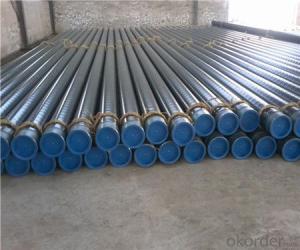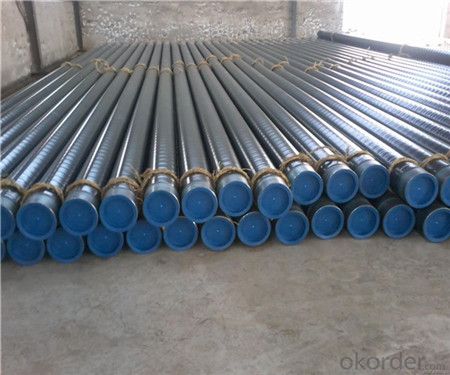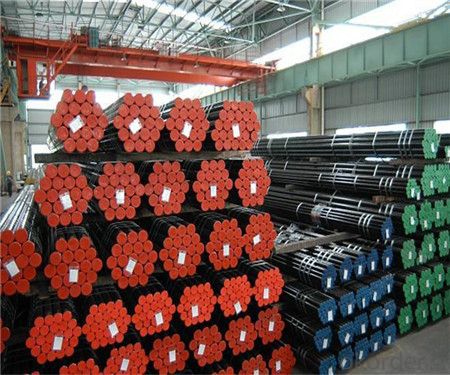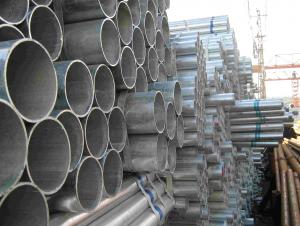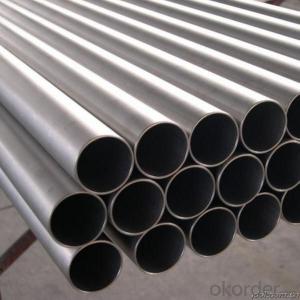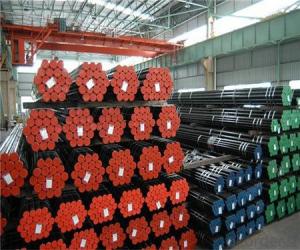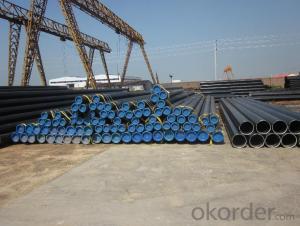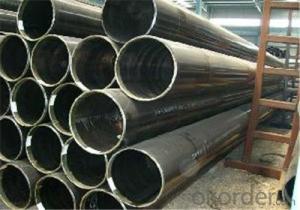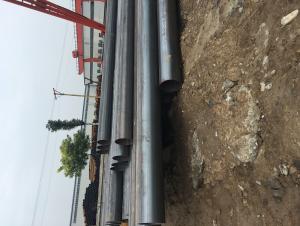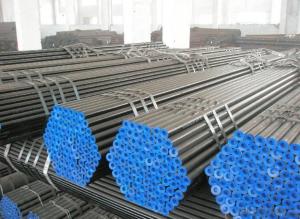Seamless Steel Pipe Line Pipe/API/GB China supplier
- Loading Port:
- Tianjin
- Payment Terms:
- TT OR LC
- Min Order Qty:
- 20 m.t.
- Supply Capability:
- 9000 m.t./month
OKorder Service Pledge
OKorder Financial Service
You Might Also Like
Product Description:
1、Structure of Seamless Steel Pipe API 5L B:
Seamless pipe is formed by drawing a solid billet over a piercing rod to create the hollow shell. As the manufacturing process does not include any welding, seamless pipes are perceived to be stronger and more reliable. Historically seamless pipe was regarded as withstanding pressure better than other types.
Standard: API SPEC 5L
● Application: To be used for conveying gas, water, and
petroleum for oil and natural gas industries
2、Main Features of Seamless Steel Pipe API 5L B:
• High manufacturing accuracy
• High strength
• Small inertia resistance
• Strong heat dissipation ability
• Good visual effect
• Reasonable price
3、Seamless Steel Pipe API 5L B Specification:
Standard | GB, DIN, ASTM ASTM A106-2006, ASTM A53-2007 |
Grade | 10#-45#, 16Mn 10#, 20#, 45#, 16Mn |
Thickness | 8 - 33 mm |
Section Shape | Round |
Outer Diameter | 133 - 219 mm |
Place of Origin | Shandong, China (Mainland) |
Secondary Or Not | Non-secondary |
Application | Hydraulic Pipe |
Technique | Cold Drawn |
Certification | API |
Surface Treatment | factory state or painted black |
Special Pipe | API Pipe |
Alloy Or Not | Non-alloy |
Length | 5-12M |
Outer Diameter | 21.3-610mm |
Grade | 20#, 45#, Q345, API J55, API K55, API L80, API N80, API P110, A53B |
Standard | ASME, ASTM |
1) Material:20#(ASTM A 106/A53 GRB.API5LGRB,GB),45#,16Mn,10#.
2) Specification range:OD:21.3-610mm,WT:6-70mm,length:6-12m or according to the requirement of clients.
3) Excutive standards:GB,ASME API5L.ASTM A 106/A53,Despite of the above standards,we can also supply seamless steel pipe with standard of DIN,JIS,and so on,and also develop new products according to the requirements of our clients!
4) Surface:black lacquered,varnish coating or galvanized.
5) Ends:Beveled or square cut,plastic capped,painted.
6) Packing:bundles wrapped with strong steel strip.
4、Packaging & Delivery
Packaging Details: | seaworthy package,bundles wrapped with strong steel strip |
Delivery Detail: | 15-30days after received 30%TT |
5、FAQ of Seamless Steel Pipe API 5L B:
①How is the quality of your products?
Our products are manufactured strictly according to national and internaional standard, and we take a test
on every pipe before delivered out. If you want see our quality certifications and all kinds of testing report, please just ask us for it.
Guaranteed: If products’ quality don’t accord to discription as we give or the promise before you place order, we promise 100% refund.
②How about price?
Yes, we are factory and be able to give you lowest price below market one, and we have a policy that “ for saving time and absolutely honest business attitude, we quote as lowest as possible for any customer, and discount can be given according to quantity”,if you like bargain and factory price is not low enough as you think, just don’t waste your time.Please trust the quotation we would give you, it is professional one.
③Why should you chose us?
Chose happens because of quality, then price, We can give you both.Additionally, we can also offer professional products inquiry, products knowledge train(for agents), smooth goods delivery, exellent customer solution proposals.Our service formula: good quality+good price+good service=customer’s trust
SGS test is available, customer inspection before shipping is welcome, third party inspection is no problem.
● Professional teams ensure a high efficiency of your purchase
▲ Professional sales team
▲ Professional engineering and technology team
▲ Professional exportation and contract processing/management team
▲ Professional cooperators and partners
6、Seamless Pipe ASTM A106/53 Images:
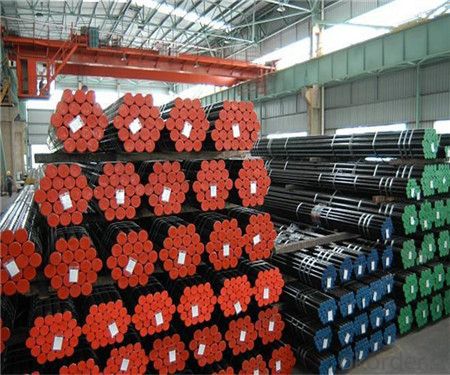
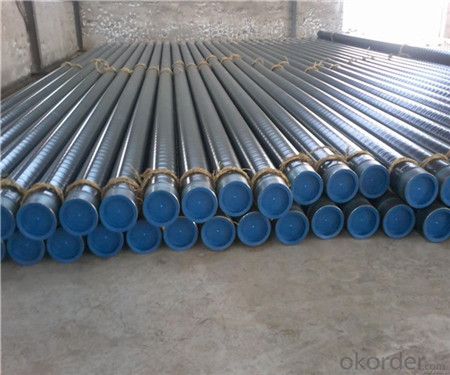
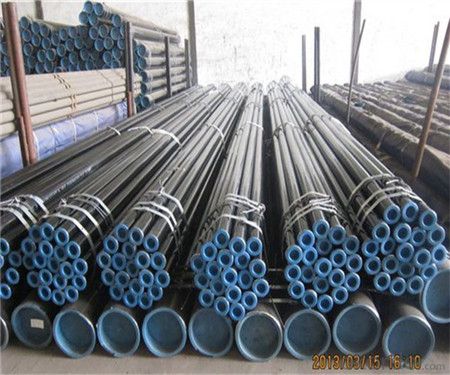
- Q: What are the different methods of repairing steel pipes?
- There are several methods of repairing steel pipes including welding, pipe wrapping, epoxy lining, and pipe bursting. Welding involves joining the broken sections of the pipe using heat and a filler material. Pipe wrapping involves applying a layer of epoxy or fiberglass wrap around the damaged area to reinforce and seal it. Epoxy lining involves applying a coating of epoxy resin on the interior of the pipe to prevent corrosion and restore structural integrity. Pipe bursting is a more invasive method where a new pipe is pulled through the existing damaged pipe, breaking it apart and replacing it in the process.
- Q: How are steel pipes used in building foundations?
- Steel pipes are commonly used in building foundations to provide structural support and stability. They are often driven into the ground to create deep foundation systems, such as pile foundations, which can bear heavy loads and transfer them to the underlying soil or rock. These pipes are also utilized in various types of foundation construction, such as caissons and drilled shafts, to ensure strength, durability, and resistance to ground movements.
- Q: Can steel pipes be used for fire sprinkler systems?
- Yes, steel pipes can be used for fire sprinkler systems. Steel pipes are commonly used in fire sprinkler systems due to their strength, durability, and fire-resistant properties. They are capable of withstanding high temperatures and are less prone to damage from fire, making them a suitable choice for such systems.
- Q: What are the different types of steel pipe supports for thermal expansion?
- There are several types of steel pipe supports for thermal expansion, including rigid supports, flexible supports, and guided supports. Rigid supports are typically used for straight pipe runs and provide a fixed point of support. Flexible supports, such as spring hangers or variable spring supports, allow for vertical movement of the pipe due to thermal expansion. Guided supports, on the other hand, restrict movement in all directions except axial movement, helping to maintain the alignment of the pipe during thermal expansion.
- Q: How are steel pipes used in the automotive exhaust systems?
- Steel pipes are commonly used in automotive exhaust systems because steel is a durable and heat-resistant material. Steel pipes are used to transport the exhaust gases from the engine to the muffler and tailpipe, ensuring that the gases are safely and efficiently expelled from the vehicle. These pipes are designed to withstand high temperatures, corrosion, and vibration, making them an essential component in the exhaust system.
- Q: How are steel pipes protected against fire hazards?
- Steel pipes can be protected against fire hazards through various methods such as applying fire-resistant coatings, installing fire-rated insulation, and implementing fireproofing measures such as fire sprinkler systems. Additionally, proper fire safety protocols, including regular inspections and maintenance, can contribute to preventing and minimizing fire hazards in steel pipes.
- Q: How do steel pipes handle expansion and contraction?
- Steel pipes handle expansion and contraction through their inherent flexibility and ability to withstand temperature variations. As steel is a ductile material, it can expand and contract without significant deformation or structural damage. Additionally, the use of expansion joints or loops in piping systems allows for controlled movement and accommodates thermal expansion and contraction effectively.
- Q: How are steel pipes used in the construction of underground parking garages?
- Steel pipes are commonly used in the construction of underground parking garages for various purposes such as drainage, ventilation, and structural support. They are used as conduits for underground utilities, including water supply and sewage systems. Additionally, steel pipes are often used as piling or foundation elements to provide stability and support to the structure, especially in areas with challenging soil conditions. Overall, steel pipes play a crucial role in ensuring the functionality and durability of underground parking garages.
- Q: What are the factors affecting the price of steel pipes?
- There are several factors that can affect the price of steel pipes. These factors include: 1. Raw material costs: The price of steel pipes is heavily influenced by the cost of raw materials such as iron ore and coal. Fluctuations in these commodity prices can impact the overall cost of production and subsequently affect the selling price of steel pipes. 2. Supply and demand: Supply and demand dynamics play a significant role in determining the price of steel pipes. When there is a high demand for steel pipes and a limited supply, the prices tend to increase. Conversely, when there is an oversupply of steel pipes and low demand, prices may decrease. 3. Production and manufacturing costs: The cost of producing and manufacturing steel pipes can have a direct impact on their price. Expenses related to labor, energy, transportation, and equipment maintenance can all contribute to the overall cost of production and, in turn, affect the selling price. 4. Market competition: The level of competition in the steel pipe industry can also influence the price of steel pipes. If there are many manufacturers and suppliers competing for market share, prices may be more competitive. On the other hand, if there are fewer competitors, prices may be higher due to limited options. 5. Government policies and regulations: Government policies and regulations can have a significant impact on the price of steel pipes. Import tariffs, trade restrictions, and environmental regulations can all affect the cost of production and subsequently influence prices. 6. Currency exchange rates: Steel pipe prices can also be influenced by currency exchange rates. Fluctuations in exchange rates between countries can impact the cost of importing or exporting steel pipes, which in turn can affect their selling price. 7. Global economic conditions: The overall state of the global economy can impact the price of steel pipes. During periods of economic growth, demand for steel pipes may be higher, leading to increased prices. Conversely, during economic downturns, demand may decrease, resulting in lower prices. It is important to note that these factors can interact with one another and fluctuate over time, making the pricing of steel pipes a complex and dynamic process.
- Q: What does carbon seamless steel pipe mean? What is the difference between a seamless 20# and an ordinary one? What is it used in detail?
- Carbon steel is relatively alloy steel. Its carbon content is higher than alloy steel, and 20# steel is one kind of carbon steel.
Send your message to us
Seamless Steel Pipe Line Pipe/API/GB China supplier
- Loading Port:
- Tianjin
- Payment Terms:
- TT OR LC
- Min Order Qty:
- 20 m.t.
- Supply Capability:
- 9000 m.t./month
OKorder Service Pledge
OKorder Financial Service
Similar products
Hot products
Hot Searches
Related keywords
